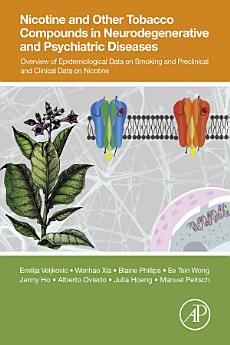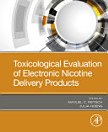Nicotine and Other Tobacco Compounds in Neurodegenerative and Psychiatric Diseases: Overview of Epidemiological Data on Smoking and Preclinical and Clinical Data on Nicotine
Emilija Veljkovic · Wenhao Xia · Blaine Phillips · Ee Tsin Wong · Jenny Ho · Alberto Oviedo Casado · Julia Hoeng · Manuel C. Peitsch
Jan 2018 · Academic Press
Ebook
164
Pages
family_home
Eligible
info
reportRatings and reviews aren’t verified Learn More
About this ebook
Nicotine and Other Tobacco Compounds in Neurodegenerative and Psychiatric Diseases: Epidemiological Data on Smoking and Preclinical and Clinical Data on Nicotine provides a comprehensive summary of the epidemiological data on smoking and several neurological disorders, including Alzheimer's disease, Parkinson's disease, Multiple Sclerosis, Tourette's syndrome, schizophrenia, anxiety, depression and ADHD, as well as preclinical and clinical data on the effects of nicotine. Despite the obvious and undisputed harmful nature of smoking, evidence suggests that some tobacco and tobacco smoke-derived constituents may offer neuroprotective effects, possibly in combinations, rather than individually. This unprecedented book describes the complex relationships between smoking and neurological disease and the bioactive compounds found in tobacco. It provides a comprehensive review of nicotine and other compounds found in tobacco plant, with scientific evidence of neuroprotective and anti-inflammatory effects that may act in conjunction with nicotine to exert neuroprotective effects observed in smokers. By presenting findings beyond harmful cigarette smoke effects, attention can be drawn to individual compounds of tobacco that may serve as inspiration for further therapy development. - Presents the first comprehensive, tabulated summary of literature on the epidemiological data on smoking and neurological disease - Includes preclinical and clinical data on nicotine in neurological diseases and mechanisms of action of nicotine in neuroprotection - Features a comprehensive summary of non-nicotine smoke constituents with potentially neuroprotective and anti-inflammatory properties - Discusses Multiple Sclerosis, Alzheimer's disease, Parkinson's Disease, Schizophrenia, Depression, ADHD, Anxiety and Tourette's Syndrome in the context of smoking and nicotine
About the author
Dr. Veljkovic is Manager - Study Management at Phillip Morris International in Neuchatel, Switzerland. Her research group is responsible for in vivo studies designed to further characterize the exact role of the cigarette smoke in initiation and development of lung pathologies (lung cancer, COPD) and CVD. She has nine years of experience in the tobacco industry, with a focus on inhalation toxicology and modeling of smoking-related diseases (lung cancer, chronic obstructive pulmonary disease) engaging systems toxicology approaches. With a thorough understanding of nicotine-related toxicity in animal models, Dr. Veljkovic and her team have prepared a number of internal strategic documents that required an extensive literature review about effects of nicotine and non-nicotine tobacco constituents in different diseases including neurological and neurodegenerative diseases. She holds BSc, MSc and PhD degrees in molecular biology and physiology.Dr. Xia is Scientist - Study Management at Phillip Morris International Laboratories with experience in drug discovery for neurodegenerative diseases. He has a profound understanding of molecular mechanisms of neurodegeneration in preclinical in vivo models and holds a BSc in life sciences and a PhD in neurobiology.Dr. Phillips is Senior Scientist - Study Management at Phillip Morris International in Singapore. His research group is focused on late-stage biological assessment of next generation reduced-harm tobacco products within the framework of the R&D department. He is an expert in inhalation toxicology and modeling of smoking-related diseases using systems toxicology approaches. He has ten years' experience in biotechnology and the pharmaceutical industry, and a thorough understanding of nicotine-related toxicity in animal models. Dr. Phillips holds a BSc in molecular biology and a PhD in medical science.Dr. Wong is Senior Scientist - Study Management and has 4 years of experience in tobacco industry, focused on OECD type of toxicology studies and modeling of smoking related diseases, especially lung cancer. Ee Tsin has a solid understanding of nicotine toxicity in rat and mice in inhalation set up. Ee Tsin holds BSc in biochemistry and PhD in biology.Dr. Ho is Scientist - Study Management with expertise in bioanalytical method and a focus on detection and quantification of smoke exposure markers. Her specialities include development and validation of analytical methods for biopharmaceuticals and chemical entities, protein sequencing, nano- and bio-material production for bioapplications, and vaccine and drug delivery systems. Dr. Ho holds a BSc in chemical engineering and a PhD in biochemical engineering.Dr. Oviedo Casado is Supervisor - Bioscience Operations, with a focus on inhalation toxicology and modeling of smoking- and inflammation-related diseases. His group is responsible for the execution of pre-clinical studies, and he manages the scientific technique portfolio. He has an extensive understanding of nicotine and tobacco products toxicity in the context of OECD type of toxicological studies. Dr. Oviedo Casado holds a BSc in biochemistry and a PhD in cell and molecular biology.Dr. Hoeng is Director of Systems Biology at Phillip Morris International and program leader. She has a profound understanding of inhalation toxicology and computational modeling of smoking-related diseases, lung cancer, COPD, and CVD. Dr. Hoeng holds a BSc in biology, MSc in bioinformatics, PhD in protein crystallography, and an executive MBA.
Rate this ebook
Tell us what you think.
Reading information
Smartphones and tablets
Install the Google Play Books app for Android and iPad/iPhone. It syncs automatically with your account and allows you to read online or offline wherever you are.
Laptops and computers
You can listen to audiobooks purchased on Google Play using your computer's web browser.
eReaders and other devices
To read on e-ink devices like Kobo eReaders, you'll need to download a file and transfer it to your device. Follow the detailed Help Center instructions to transfer the files to supported eReaders.





